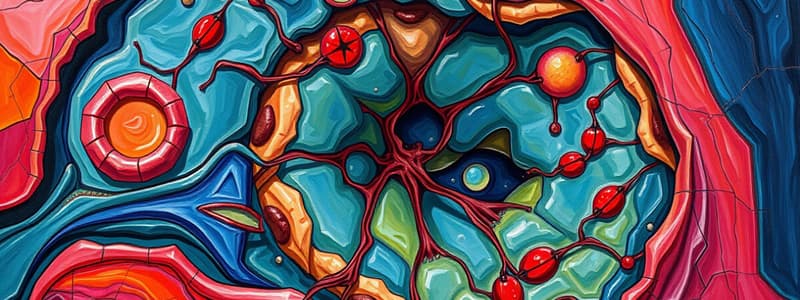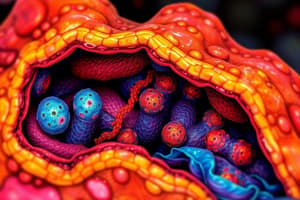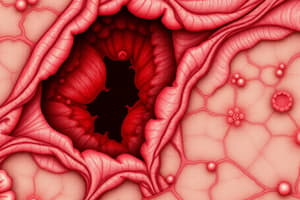Podcast
Questions and Answers
What type of wound healing results in scar formation?
What type of wound healing results in scar formation?
- Secondary intention
- Repair (correct)
- Regeneration
- Primary intention
Which phase of wound healing is characterized by blood vessel growth and inflammatory cell recruitment?
Which phase of wound healing is characterized by blood vessel growth and inflammatory cell recruitment?
- Inflammation (correct)
- Proliferation
- Remodeling
- Hemostasis
During which stage does the wound begin to close and re-epithelialization occur?
During which stage does the wound begin to close and re-epithelialization occur?
- Hemostasis
- Inflammation
- Proliferation (correct)
- Remodeling
What is the primary goal of the hemostasis phase in wound healing?
What is the primary goal of the hemostasis phase in wound healing?
What characterizes the remodeling phase of wound healing?
What characterizes the remodeling phase of wound healing?
What is the primary role of neutrophils and macrophages during the inflammation phase of wound healing?
What is the primary role of neutrophils and macrophages during the inflammation phase of wound healing?
Which phase of wound healing occurs immediately after a wound and focuses on stopping bleeding?
Which phase of wound healing occurs immediately after a wound and focuses on stopping bleeding?
During which phase does the conversion of collagen III to collagen I occur?
During which phase does the conversion of collagen III to collagen I occur?
What is a key characteristic of the proliferation phase in wound healing?
What is a key characteristic of the proliferation phase in wound healing?
What follows the inflammatory phase in the wound healing process?
What follows the inflammatory phase in the wound healing process?
What does the 'M' in the TIME clinical decision tool stand for?
What does the 'M' in the TIME clinical decision tool stand for?
How does the oral mucosa differ from cutaneous wounds in terms of healing?
How does the oral mucosa differ from cutaneous wounds in terms of healing?
What role does saliva play in the wound healing process in the oral cavity?
What role does saliva play in the wound healing process in the oral cavity?
Which of the following cytokines is notably lower in oral epithelium, contributing to less scarring during healing?
Which of the following cytokines is notably lower in oral epithelium, contributing to less scarring during healing?
Which of the following factors affects wound healing according to the provided content?
Which of the following factors affects wound healing according to the provided content?
What characterizes neurapraxia in nerve healing?
What characterizes neurapraxia in nerve healing?
What is the first radiographic evidence of bone formation after tooth extraction?
What is the first radiographic evidence of bone formation after tooth extraction?
Which mechanism is NOT one through which bone grafts can regenerate bone?
Which mechanism is NOT one through which bone grafts can regenerate bone?
In which nerve healing classification does Wallerian degeneration occur?
In which nerve healing classification does Wallerian degeneration occur?
What is the expected rate of axonal regeneration after axonotmesis?
What is the expected rate of axonal regeneration after axonotmesis?
What is the initial response of the healing process in the alveolar socket after tooth extraction?
What is the initial response of the healing process in the alveolar socket after tooth extraction?
Which systemic factor can contribute to impaired healing?
Which systemic factor can contribute to impaired healing?
What role do osteoclasts play in the healing process after a tooth extraction?
What role do osteoclasts play in the healing process after a tooth extraction?
What is a potential complication that can arise during the healing process?
What is a potential complication that can arise during the healing process?
Which factor is a local contributor to impaired healing?
Which factor is a local contributor to impaired healing?
During the healing of an alveolar socket, what is the role of the fibrin meshwork?
During the healing of an alveolar socket, what is the role of the fibrin meshwork?
What is one characteristic of the primary healing phase by the end of the third week post extraction?
What is one characteristic of the primary healing phase by the end of the third week post extraction?
What systemic factor influences the healing process in individuals recovering from surgeries?
What systemic factor influences the healing process in individuals recovering from surgeries?
Flashcards are hidden until you start studying
Study Notes
Wound Overview
- Wounds can be classified as open (laceration/puncture) or closed (blunt force trauma).
- Healing restores damaged tissues and normal function.
Healing Mechanisms
- Regeneration: Complete restoration of tissue, no scars, full function return.
- Repair: Involves connective tissue proliferation, some original structure restoration, scar formation, and loss of function.
Phases of Wound Healing
- Hemostasis: Begins immediately after injury, stopping bleeding through vascular constriction and fibrin clot formation.
- Inflammation: Occurs within days, characterized by blood vessel dilation, neutrophil and macrophage action to prevent infection, and signs like edema and heat.
- Proliferation: Lasts weeks, focuses on covering the wound, forming granulation tissue, and restoring blood vessels.
- Remodeling: Takes from 21 days to 2 years, where tissue strengthens and matures, collagen reorganization occurs, achieving up to 80% tensile strength.
Detailed Phases
- Phase 1 - Hemostasis: Involves platelet aggregation and inflammatory cell recruitment to control bleeding.
- Phase 2 - Inflammation: Involves vasodilation, immune cell activity, debris removal, and prevention of infection.
- Phase 3 - Proliferation: Covers wound with a collagen matrix, decreases blood vessels, and initiates re-epithelialization.
- Phase 4 - Remodeling: Collagen III is converted to collagen I, leading to increased tensile strength over time.
Wound Assessment
- Utilizes the TIME clinical decision tool:
- T: Tissue viability
- M: Moisture balance
- I: Infection status
- E: Wound edges assessment
Comparison: Skin vs. Oral Mucosa
- Oral mucosa heals rapidly with minimal scarring and lower inflammatory response.
- Lower levels of TGF-Beta1 in oral epithelium reduce hypertrophic scarring.
Role of Saliva
- Saliva promotes wound re-epithelialization through hydration and a suitable pH.
- Contains antimicrobial components that facilitate healing and fibroblast activity.
Factors Affecting Wound Healing
- Local Factors: Oxygenation, foreign bodies, moisture balance, infection, stress from mechanical forces.
- Systemic Factors: Stress, nutrition, age, smoking, obesity, and immunocompromised states.
Complications in Wound Healing
- Common issues include infections, hypertrophic scars, keloids, hematomas, dehiscence, and necrosis.
Bone Healing and Repair
- Process begins with a blood clot post-extraction, followed by granulation tissue formation.
- Bone remodeling transforms immature bone to lamellar bone over several months.
- Grafting can initiate healing through osteogenesis, osteoconduction, or osteoinduction.
Nerve Healing and Repair
- Neuropraxia: Temporary myelin damage with complete recovery within 12 weeks.
- Axonotmesis: Axonal injury with intact connective tissues, leads to slow regeneration (~1mm/day).
- Neurotmesis: Complete nerve transection requires surgical intervention for recovery.
Studying That Suits You
Use AI to generate personalized quizzes and flashcards to suit your learning preferences.



